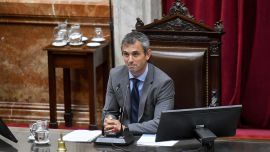Argentina is far from being the only country in which large numbers of people would dearly like to exchange the local political elite, which in their view is dominated by bloodsucking time-servers who care little for what is happening to ordinary folk, for something that would be more to their liking. Similar sentiments have split the United States down the middle and are making life difficult for governments in much of Europe.
In most places, the old guard has managed to fend off those besieging it. Even if on occasion the establishment’s forces have had to beat a retreat, they have usually retained enough power to thwart their enemies. In the United States, where Donald Trump’s rebel army could retake power in November, his previous attempts to bring about radical changes of the kind many appear to want were not particularly successful, while in Europe, governments like that of Italy’s Giorgia Meloni have let most things remain as they are.
The reason for this is simple enough. Though many feel that much is fundamentally wrong with the dispensation they live with, when it comes to replacing it with a better one, few have been able to come up with anything that is remotely plausible.
This may not be the case in Argentina because there can be little doubt that the Peronist order, which is itself the result of a collective decision to repudiate a far earlier status quo, ran out of steam many years ago, but, as Javier Milei is finding out, the forces arrayed against those who want to dismantle it and try something different are still very powerful.
At first sight, Argentina’s elite has little in common with those of North America and Europe. It is unabashedly “populist,” extravagantly corrupt and, with the odd exception – Cristina Fernández de Kirchner once treated a roomful of philosophy professors to a lecture on Heidegger and Hegel in which she told them she preferred the latter because he was “more inclusive” – its guiding spirits do not claim to be more erudite than their critics. However, members of Argentina’s political elite have also made the most of the power and influence they have accumulated in order to acquire what many think are undeserved privileges which, needless to say, they are determined to keep. As they and their allies are very well entrenched in the political institutions, they are in a position to block any changes that could inconvenience them.
For a short while, Milei assumed that Congress, suitably impressed by his emphatic electoral triumph, would be happy to let him reshape the economy and much of the political system, but on Tuesday he was suddenly stopped in his tracks. Though many of the objections to the “omnibus bill” he hoped to ram through before legislators recovered from the shock they received in November seemed to be based on nothing but spite, others were reasonable enough. After all, it was undeniable that he wanted to be given near dictatorial powers. However, in response to those who see him as a would-be tyrant, he can argue that Argentina’s crisis is so dangerous that leaving everything in the hands of a fractious parliament could prove fatal. Unfortunately for him and, perhaps, for the country, most legislators disagreed.
Unlike the many people elsewhere who demand change but are unable or unwilling to be more specific, Milei does have an overall strategy which, on the whole, seems fairly realistic. He wants to balance the budget, reduce public spending, refrain from printing zillions of almost worthless banknotes, lower taxes which hereabouts are among the highest in the world, scrap harmful regulations that make it hard to do business and encourage local companies to become internationally competitive. None of this can be considered outrageously fanciful, but while most politicians appear to agree that Argentina has lost the long war that, in her name, the elite has waged against capitalism, all but a few refuse to accept even minor changes that could cause trouble to them or their friends.
Milei campaigned against the “political caste” – the word used by leftists in Spain for what Trump and his backers call “the Deep State” and some in the UK “the blob,” which they accuse of resorting to devious means to defend the status quo – so he cannot have been that surprised by the behaviour of lower-house lawmakers who made the most of an opportunity to tell him where to get off. Nonetheless, he and his Economy Minister Luis Caputo think the presidency has enough power to let them plough ahead with their ambitious financial reforms. Milei is also toying with the idea of staging a plebiscite which, he hopes, would remind his political foes that most people still heartily despise “the caste” they belong to and therefore disapprove of their obstructive tactics.
The fiercest opposition to the libertarian government comes from the Kirchnerites and their Trotskyite allies who either deny that Argentina is undergoing a serious economic crisis or (if they accept that the situation left by Cristina, Alberto Fernández and Sergio Massa was not exactly rosy) blame soaring inflation, low wages, the shrivelling of pensions and other unpleasant developments squarely on Milei and Mauricio Macri. Up to now, they have not had much success with this line of argument, but sooner or later people will start agreeing that Milei has made what was an already desperate state of affairs even worse.
So, what do those who make no secret of their desire to send Milei packing so they can return to power really want? Do any of them sincerely believe that they could make life easier for the general population? Probably not, but seeing they are more interested in power for its own sake than for what they could do with it other than using it to make money for themselves or occupy prestigious positions, they are not the kind of people who are willing to waste time asking themselves such questions. As far as they are concerned, defeating the “right-winger” who seeks to turn Argentina into a free-market powerhouse would be more than enough, and if achieving what they are after would mean allowing their country to a devastated by a hyperinflationary tsunami that would impoverish even more people than they managed to do, that would be a small price to pay for what they would hail as a major, world-shattering victory for their side.























Comments